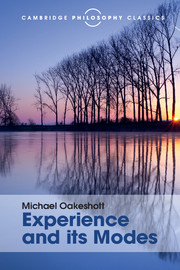2 - Experience and its modes
Published online by Cambridge University Press: 05 November 2015
Summary
The purpose of this chapter is to consider the general character of experience. And here, as elsewhere, what I have to offer is merely a point of view, defended briefly and as best I can. I shall consider first experience in its most general character, secondly experience and truth, thirdly experience and reality, and lastly the modes of experience.
Experience everywhere involves judgment
‘Experience’, of all the words in the philosophic vocabulary, is the most difficult to manage; and it must be the ambition of every writer reckless enough to use the word to escape the ambiguities it contains. I will begin, then, by indicating what I take it to denote. ‘Experience’ stands for the concrete whole which analysis divides into ‘experiencing’ and ‘what is experienced’. Experiencing and what is experienced are, taken separately, meaningless abstractions; they cannot, in fact, be separated. Perceiving, for example, involves a something perceived, willing a something willed. The one side does not determine the other; the relationship is certainly not that of cause and consequent. The character of what is experienced is, in the strictest sense, correlative to the manner in which it is experienced. These two abstractions stand to one another in the most complete interdependence; they compose a single whole. It would, then, be possible to build up one's view of the character of experience either from the side of experiencing, or from the side of what is experienced; and it would be superfluous to do both, for whatever is true of the one side will be true also of the other. But, since it is our business in philosophy to avoid abstractions, this concrete whole, experience, is what calls for attention. And what I am concerned with primarily is not experiencing severed from what is experienced, or what is experienced severed from experiencing, but with experience itself, the concrete whole.
Reflection on the character of experience finds in most men a mind filled with prejudice and confusion; and not uncommonly these prejudices and this confusion will be found to spring from distinctions elevated into differences. One such distinction is that which divides experience into the part which may properly be called thought, that which (because it is more elementary or immediate) falls short of the condition of thought, and that which passes beyond the condition of thought.
- Type
- Chapter
- Information
- Experience and its Modes , pp. 7 - 65Publisher: Cambridge University PressPrint publication year: 2015



